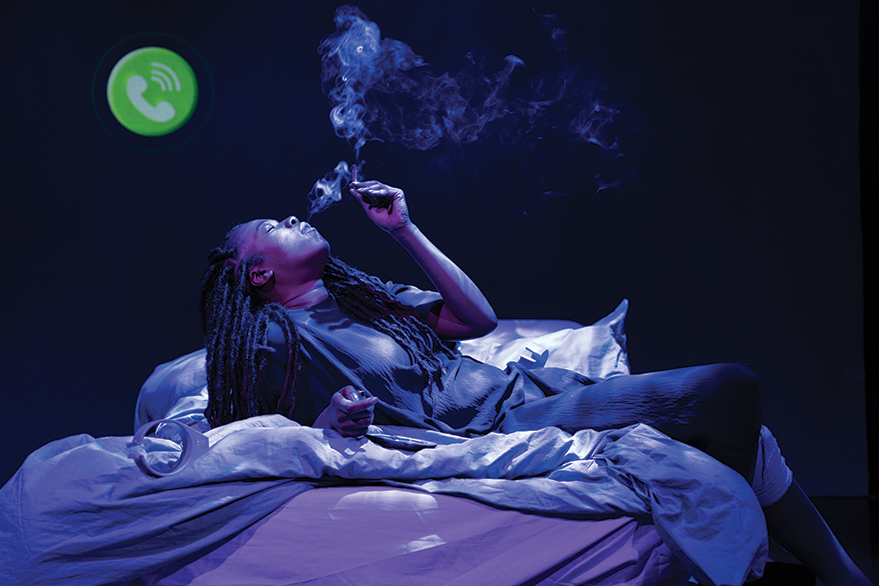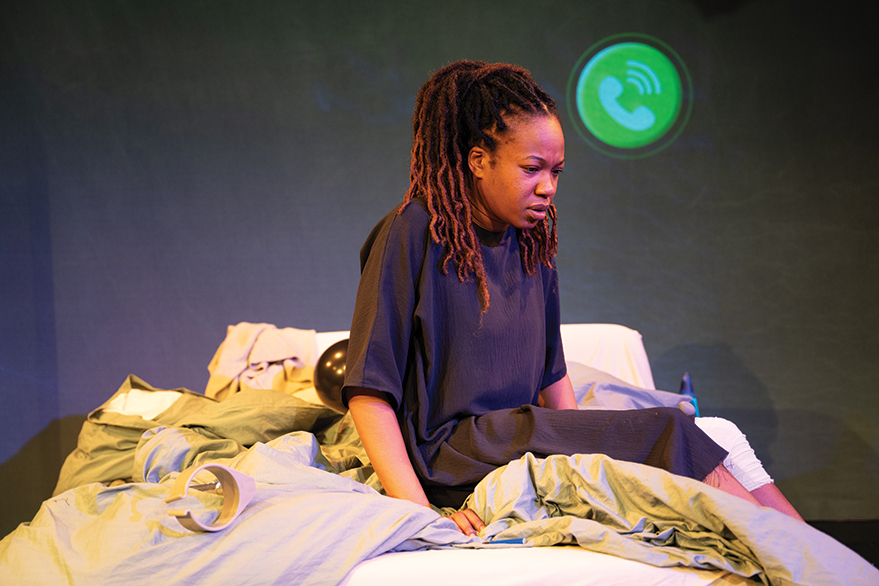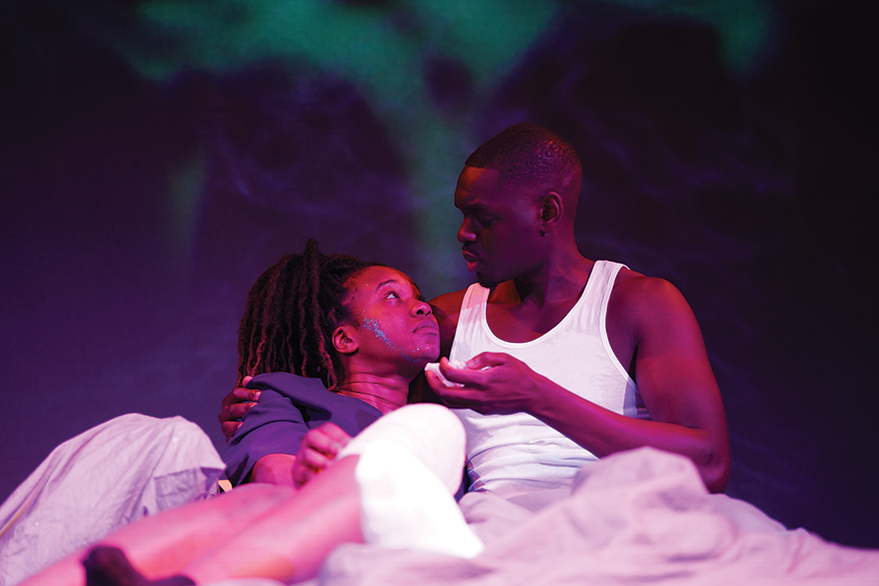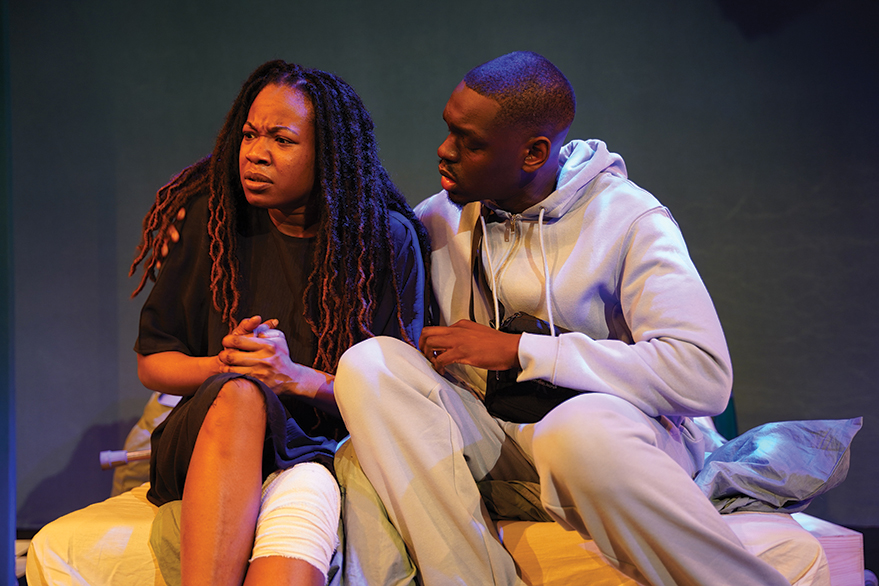Q+A Evlyne Oyedokun
"When I first saw Evlyne Oyedokun perform in Blackbird Hour at London’s Bush Theatre, I was electrified. The play - a haunting meditation on grief, identity, and healing - centered on the experience of a queer Black woman. But it was Evlyne’s performance that stayed with me long after I returned to Rome. Her truth, her vulnerability, her quiet strength. There was no separation between her and the role. She didn’t act. She let us in. Her performance stayed with me long after the lights were out and even back in Rome."

“When I first saw Evlyne Oyedokun perform in Blackbird Hour at London’s Bush Theatre, I was electrified. The play – a haunting meditation on grief, identity, and healing – centered on the experience of a queer Black woman. But it was Evlyne’s performance that stayed with me long after I returned to Rome. Her truth, her vulnerability, her quiet strength. There was no separation between her and the role. She didn’t act. She let us in. Her performance stayed with me long after the lights were out and even back in Rome.”
Evlyne Oyedokun is a black autistic actress. That truth is woven into everything she is – her art, her presence, her way of navigating the world. It’s not a label she wears, but it shapes her experience and the way she shows up, unapologetically.
We met in a quiet café on a surprisingly sunny day for London. I came with a notebook full of prepared questions, but I didn’t ask a single one. My questions didn’t matter anymore – she had already decided how this story would be told.
What followed were hours of trying to capture Evlyne’s essence in words. But no interview format could hold the complexity of her spirit. So I’m stepping away from traditional storytelling to offer you a glimpse into Evlyne’s world as it really is: raw, vibrant, and beautifully unfiltered.
Here’s to meeting her on her own terms – the way she thinks, the way she feels, the way she lives.
“I wasn’t good at communicating at school. I was always by myself and couldn’t speak to people. I struggled even with my family. At Christmas, I’d hide under the stairs – that was my comfort zone. I had imaginary friends – not real ones, but I’d use objects and imagine them as something else. My teachers said I lacked confidence. So my mother encouraged me to join a youth club in Camden, the Young Persons Theatre Company. I emailed them, and they said they were holding auditions. They asked if I could do a monologue. I had no idea what that was, so I Googled it. And I wrote one about my brother who passed away when I was five.
When I performed it in front of the director, something came over me. I had all these emotions and I thought: “Why am I crying? What’s going on?”. I’d never experienced that before. Never. The director started crying too. When my mum came in, she cried – not because I was crying, but because it was the first time I’d spoken fluently to a stranger. She said she’d never heard me talk like that.
At the time, I hadn’t been diagnosed with autism – we just thought I’d grow out of my speaking difficulties. And that’s how I got into theatre”.
“I used to whisper a lot. If someone was right next to me, I didn’t see why I had to speak loudly. I didn’t understand that others needed to hear you – it wasn’t just about the person in front of you. I always sounded like I was apologising because I didn’t want anyone to be mad at me. Or misunderstand what I was saying. There were lots of things I had to figure out. People said I had a five-year-old voice. I’m tall, but my voice didn’t match my body. I thought, it doesn’t matter, you can still understand me. If you couldn’t hear me, that was even better. That’s how I used to be. So it took me ages to get out of that.
The first time I ever heard myself speaking in voice – I cried. I wasn’t in control of the vibrations, the power of sound was happening. Embracing myself as an instrument – it was a weird feeling. To have this big bass sound – it was overwhelming, but also empowering.

Then one day in a sight-reading class, we were reading The Curious Incident of the Dog in the Night-Time. They were analysing the boy who had autism. But when I read it, I thought, there’s nothing wrong with him. Why don’t they see that? I thought they were analysing me. I needed to leave the room – I didn’t know what was happening. At that time, they thought I had OCD because of my repetitive behaviours. But then they referred me to another mental health centre that specializes in adult autism. By the time I was in my second year at RADA, I was diagnosed with autism. And suddenly, everything made sense. I could finally understand myself.
And RADA was able to create a safe space for me once they knew what my needs were. I could leave the room if I needed to. Loud sounds would make me fall to the floor. It’s like when cats or animals hear a loud noise. Even during rehearsals, when someone had to shout, I’d just drop to the floor if I wasn’t ready. I can’t explain this – it’s just what my body does.
Honestly, finding out I’m autistic was the best thing ever. It explained why I keep
doing the things I do. It finally made sense. Before that, people tried to self-diagnose me, saying it was a bit of this or that – but I knew there was something more. When I was younger, I used to think everyone else was crazy and that I was the only sane person in the world”.
The Hidden Language of Emotions
“I didn’t know how to express emotions. I’d probably be more able to describe emotion in colours: I’m feeling purple, blue, pink, yellow. They exist, but I’ve never experienced them. Theatre helped me to understand what they are.
When I first got to drama school, all I knew was “happy” and “sad”. But I never really knew what I was learning about because you never experienced that. I used to think that I was really silly. But then one of my teachers said, “There’s also emotional intelligence.” And then I thought: “Maybe that is what it is.”
I think emotional intelligence just came with experiencing loads from a young age and just watching people. Seeing how people’s reactions and the effects people have, the effects of words. Because everything has a cause and effect. And how everything is all connected in this big thing. Just knowing that makes me always aware that everybody’s always got a “different temperature”. And that temperature can always change. I always get worried about meeting someone and then, for instance, meeting them in a week or a month or two. Are our temperatures gonna align? Are we gonna be alright? I don’t know what they’ve been through. How are we gonna start this conversation?
I’ve had to sort of get over that, because a lot of times the temperatures are fine. There’s nothing to worry about. And you just sort of pick up where you left off.
People say things they don’t actually mean, and that’s really weird to me, because I always say things that I mean. My mind’s not the usual way… People don’t always think like I do, and I can’t be upset about that. I had to learn that, because I kept wondering why others didn’t carry on this big-picture way of looking at the world. A lot of times, I already knew why someone was upset – because I’d noticed things throughout the day. I’d piece together a story from what I’d seen. Like, maybe they didn’t eat their salad today, but they did yesterday. It sounds silly, but all those little details paint a picture, and suddenly I realize “Oh, that makes sense.”

In my head, I’m just linking all the clues, like knitting or like in a detective movie – threading everything together. I used to think it was being nosy, but it’s not. My mind just needs to solve the puzzle of the situation. Once it’s done, it moves on to the next. Sometimes it gets tiring because the more I socialize, the more puzzles I have to solve. And then I sleep. A lot.
A lot of the time, I didn’t understand what others were saying either. I didn’t get jokes. I’d laugh at how people reacted to them – not the joke itself. Being by myself so much, I had to find humour in many things. I watch people, I observe, and make my own narrative in my head. I spent a lot of time in my head, learning from everyone around me. Each person taught me something, even if I’m not close to them now”.
Living Between The Worlds
“Acting helps with my autism. When I’m not acting, I don’t really talk to anyone. I’m too scared. I don’t know who they are. Without drama school and classes, you’re just alone with the walls. Acting feels safer – there’s a beginning, middle, and end. You can play with it. But in the real world, you can’t play like that. Nothing’s safe. You never know what’s coming. That’s the scariest part – the unknown.
But on stage, in theatre, film, or screen – whatever the platform – you can be free. It’s safe. You can explore the unknown within that safety. Most of the time, I’m living on stage more than I’m living in real life. Real life is more like acting, while on stage – I am real. And that’s why I love acting so much. Because you know what’s going to happen. And then you can forget about it and play with it. You can’t do that in real life”.
“I thought that I would always play the victim, the timid person, because that’s all I knew. And all of a sudden, they taught me about my voice and the depth and being grounded and I realized: “There’s another version of me!” And now they’re giving me auditions for people like Catania and Cleopatra.
“They already knew that I could do it. I didn’t think I could do it. I’d say: ‘What do you see in me? Just because I’m tall? Wait, let me shrink a little bit.’
So that’s what I wanted. I wanted to shrink, to play the victim, because I think probably for my past. Because I didn’t think I could be strong. I was scared to be strong. I wanted to hide because I didn’t understand things. I used that as a way to disappear. And I’m glad that I came out of that.”
“I have so many different personalities. Not in a bad way. I’m not one thing. I’ve got a lot of facets. I can’t be put in a box. I never know exactly what I’m going to be from moment to moment. I can’t be just one thing.
It varies. It’s fluid. I’m just a big, complex personality. I don’t always show it in the same way. It depends on the circumstance, the situation, the time of day.

And I’d love to explore all kinds of roles, honestly, because I find all types of humans and personalities fascinating. I would never turn down a role – whether it’s the ugliest, the coolest, or even a serial killer. People like that exist, and I watch lots of things about them because they were once someone’s child.
I’m curious about exploring different emotions too, and that benefits me a lot. Every job teaches me something about myself. It’s not just for the audience; it’s for me too. With every role, I grow stronger, even if I don’t always feel it at the time.
You have to put all your stuff aside and just be in the moment, which is so hard, but it’s the most generous thing you can offer the audience. It’s not about you – it’s about them experiencing the story. You’re just a vessel, travelling the story through you to them, and that’s it. At the end of the day, theatre is therapeutic.
I think it might not be for everyone. Constantly wearing your heart on your sleeve, while having reviewers dislike you or express their opinions, it can be really hard on your soul. Do I care about reviews? Oh, I do. But there is no reason to stop. Since my father’s death, I haven’t stopped working. That’s what he wanted for me. Every job I take is for him. Everything I do is for him. That’s what keeps me going. He wanted me to continue, so I will never stop.” [ V ]
